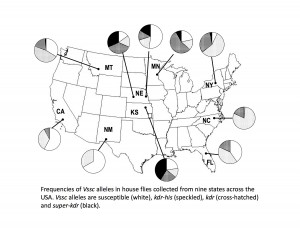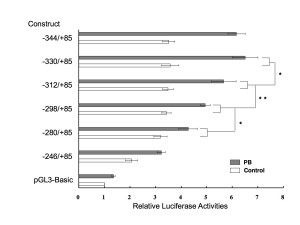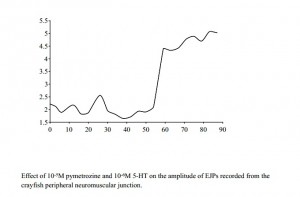Our research is characterized by the five major areas below and seeks answers to both applied and basic questions. The techniques we use are varied and wide ranging.
Insecticide resistance and evolutionary biology. Resistance is one of the major problems facing public health and agriculture. Resistance has been referred to as “instant evolution” and causes major disruption whenever vectors of human disease or pests of agriculture can no longer be controlled. We study resistance as both a problem for which we need practical solutions, as well as an intensely interesting problem in basic evolutionary biology. We specialize in investigating the mechanisms (biochemical and genetic), inheritance, management, fitness costs and population genetics of insecticide resistance.

Insect genetics and molecular biology are active areas of research in our laboratory. We examine the genetic control and linkage of important traits (such as insecticide resistance), and we are now investigating the transcriptional control of genes responsible for insecticide resistance. We are also investigating the role of RNA editing of genes coding for proteins of importance to insecticide action.
Sex determination in house flies is studied to better understand the factors responsible for the differences in the linkage of the male determining factor in field populations. Clines in the distribution of autosomal males exist and appear to be stable. Some populations have males with multiple copies of M and we have recently detected the female determining factor F in house flies from the USA.

Insecticide toxicology and metabolism studies are carried out to better understand the target sites of current and novel insecticides, as well as their pharmacodynamics (movement and fate within the organism). Studies have involved neuophysiological investigations into insecticide action as well as efforts to identify the enzymes involved in the metabolism of the insecticide.
 Cytochrome P450 monooxygenases are a vital biochemical system because they metabolize xenobiotics such as drugs, pesticides and plant toxins, and because they regulate the titers of endogenous compounds such as hormones, fatty acids and steroids. Cytochrome P450 (P450) is a hemoprotein which acts as the terminal oxidase in monooxygenase systems and there are multiple P450s in eukaryotic species. Monooxygenases are remarkable in that they can oxidize widely diverse substrates and are capable of producing a bewildering array of reactions. Our studies involve identification of novel P450s, identification of P450s involved in metabolism of specific substrates, and the role of P450s in insect reproduction.
Cytochrome P450 monooxygenases are a vital biochemical system because they metabolize xenobiotics such as drugs, pesticides and plant toxins, and because they regulate the titers of endogenous compounds such as hormones, fatty acids and steroids. Cytochrome P450 (P450) is a hemoprotein which acts as the terminal oxidase in monooxygenase systems and there are multiple P450s in eukaryotic species. Monooxygenases are remarkable in that they can oxidize widely diverse substrates and are capable of producing a bewildering array of reactions. Our studies involve identification of novel P450s, identification of P450s involved in metabolism of specific substrates, and the role of P450s in insect reproduction.